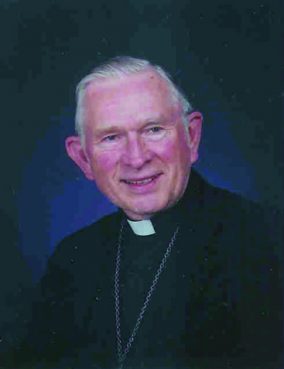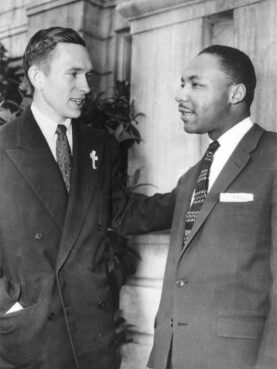
The Rev. Robert Graetz. Photo courtesy NewSouth Books
(RNS) — The Rev. Robert Graetz, a Lutheran pastor and the only white minister in Montgomery to support Rev. Martin Luther King Jr.’s bus boycott, died Sunday (Sept. 20).
He was 92.
Rev. Graetz had been in hospice care before his death, according to the Montgomery Advertiser.
The former pastor of Trinity Lutheran Evangelical Church, a predominantly Black congregation, Graetz helped organize the boycott and served as a driver for participants who needed transportation.
Because of his support for the boycott and the Rev. King, Graetz’s home was bombed and his family threatened.
Graetz had moved to Montgomery in 1955 after being assigned to Trinity.
“We had very few black pastors because we required seminary training for all pastors,” Graetz told Religion and Ethics Newsweekly in 2011. “That’s why they needed some white pastors like me to serve in largely black congregations.”
RELATED: King’s early white ally still fights for ‘beloved community’

The Rev. Robert Graetz, one of the early white allies of the Rev. Martin Luther King Jr. in Montgomery, Ala., with the civil rights icon in an undated photo. (AP Photo/Gene Herrick)
One of Graetz’s former church members told the Advertiser that he was “a wonderful pastor.”
The bus boycott began about six months after Graetz had arrived in Montgomery. By that time Graetz had already met the Rev. King and Rosa Parks and wanted to stand beside them.
He once described the bus boycott as Black Christians “teaching white Christians what it means to be Christian.”
After the boycott ended, he remained involved in the civil rights movement and took part in the famed March on Washington.
“Even though we had had many other people from different faiths and different ethnic groups taking part in particular parts of the civil rights movement,” Graetz told Religion News Service in 2013, “it was clear that that massive turnout of people — ethnicities, all economic levels, everything imaginable — (showed) there’s something to the promise of the beloved community that Dr. King used to talk about. It gave all of us a real boost in terms of what the possibilities might be.”
RELATED: Memories of the March: 10 voices recall 1963 March on Washington
Graetz left Montgomery in 1958 to serve a church in Columbus, Ohio. He eventually moved to Washington, D.C., to work as a lobbyist before he and his wife, Jeannie, returned to Montgomery in 2011.
Survivors include his wife, seven children, 27 grandchildren, 13 great-grandchildren, and one great-great-grandchild.




